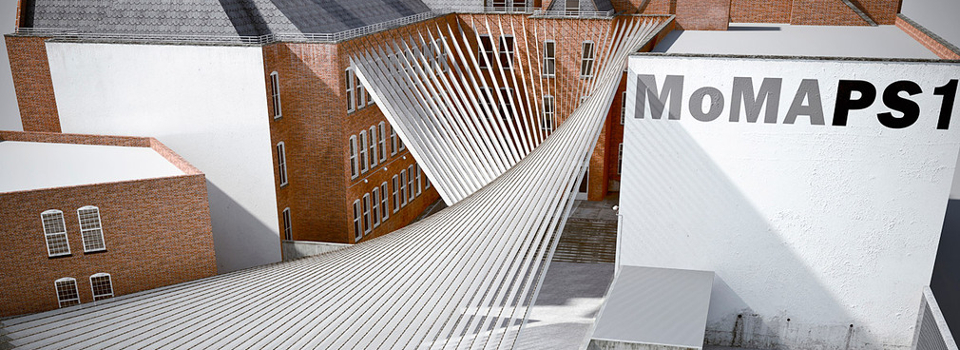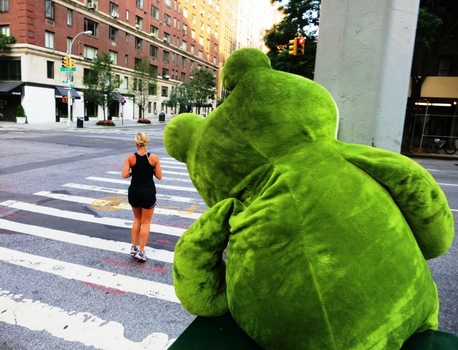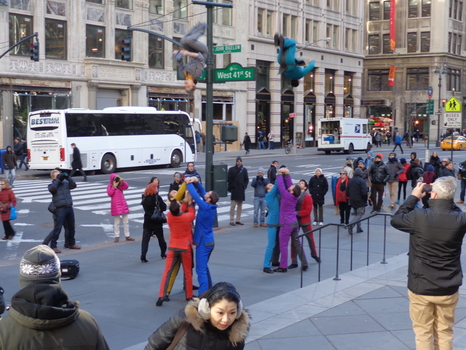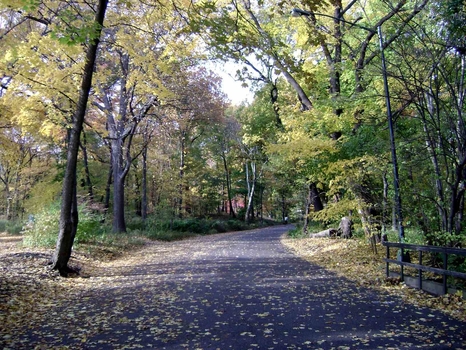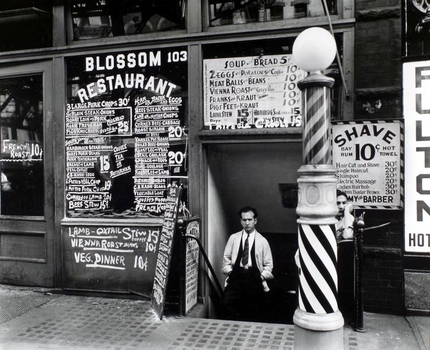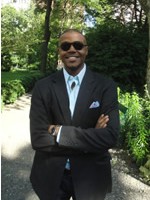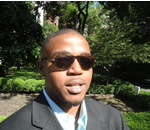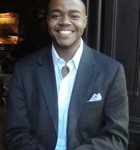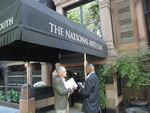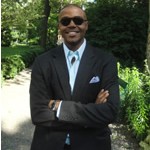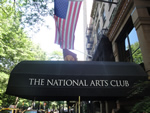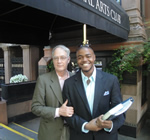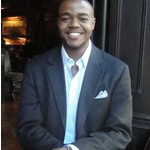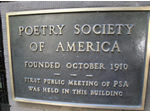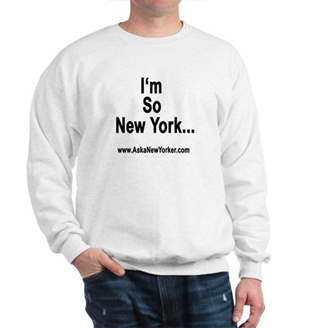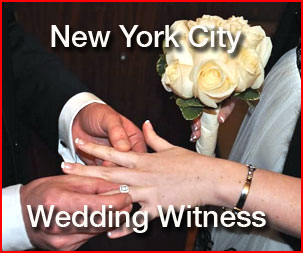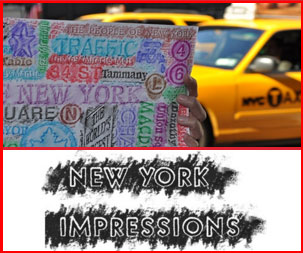Ask a New Yorker: It’s great seeing you. What’s going on? What did you just say?
Darrel: I’d hate to leave New York on such a beautiful day and go to L.A because it feels like L.A is here when NY is sunny.
Ask a New Yorker: Why are you going to L.A?
Darrel: I’m going to L.A to host an all-star event. A reading with the fabulous poets Janice Harrington who won the Kate Tuffs award in poetry, Kevin Simmonds, the Emmy award winning composer and poet, Monica Lee Copeland, and Anna Journey both fabulous renowned poets and performers as well.
Ask a New Yorker: You have a beautiful name. Your middle name I’m afraid I’ll butcher, I couldn’t pronounce ‘aluminum’ until I was 15 years old. Darrel Alejandro Holnes.
Darrel: I’m from Panama. Alejandro is a bit of a family name but only by coincidence. It turns out that I have a few cousins born in different parts of the world around my same age. My father as well as his siblings decided all to give their sons the same middle name. Just completely by coincidence, so I have two other cousins who also have the same name, together we are The Alejandros.
Ask a New Yorker: A certain New Yorker comes to mind as well.
Darrel: Yes, it’s true, there’s also the Lady Gaga song, ‘Alejandro,’ – a fun song. I’m a big Lady Gaga fan. I saw her perform in Detroit both before she was famous and after, but when The Fame Monster album debuted,’ Alejandro’ was my least favorite song of all the tracks. And then I saw the video.
Ask a New Yorker: We are sitting inside the National Arts Club. Pray tell?
Darrel: Well, the National Arts Club is the former Tilden Mansion on Gramercy Park. I’m a member here, and work with Poetry Society of America, our offices are upstairs. It’s always a gay ol’ time working every day at the heart of New York City’s arts and culture patronage. Some times at night you even hear the heart beating. I heard that once it even broke. But that was before I came along.
Ask a New Yorker: So what do you do?
Darrel: I’m a poet and a playwright, and I’m also the program director for the Poetry Society of America, among other things.
Ask a New Yorker: Describe your parents.
Darrel: My mother is fierce in all the ways Tyra Banks intends the word to mean, though the dictionary says otherwise. She’s beautiful, smart, and nurturing. My father’s a titan. They both worked for the government in different capacities. While I was growing up my father worked for the Panama Canal and my mother worked for the US federal government. So I grew up in el mundo – embassy kids, international schools, serious world travel, and tons of pressure to change the world, to matter. And of course, the Canal was in my backyard.
Ask a New Yorker: I’ve been to different locks up in Maine from one lake to another but the Panama Canal must be amazing.
Darrel: I lived within probably a mile of the Panama Canal. My family is a ‘familia canalera’, which means that our family’s history goes back to the foundation and construction of the Canal in 1914. It’s really important to my family’s heritage and I am the last generation of the ‘familia canalera’ as I also worked for the Panama Canal, briefly.
Ask a New Yorker: In what capacity?
Darrel: I was the assistant to the Chief of Protection and Security of the Panama Canal.
Ask a New Yorker: You were making sure no drugs got through?
Darrel: Among other things.
Ask a New Yorker: It’s interesting how people meet. We met at LAX as I was heading to Hawaii for a wedding. We learned later that the groom’s sister is a dear friend of yours, small world. Her name is Star Black.
Darrel: Star is a phenomenal poet and collagist and a dear friend to poetry. I would say a New York legend. It was fun to meet her after I moved to New York and sort of be introduced to this community through her experiences. It’s been really fun getting to know her and her work. She’s an amazing photographer as well. I have a lot of respect for SuperStar. Shine on, girl! And you know, it makes sense that a poet that is so New York in my mind is less than six degrees from Ask a New Yorker.
Ask a New Yorker: Shelly wrote: “Poets are the unacknowledged legislators of the world”
Darrel: I think Shelly’s quote really speaks to the role that poetry plays in any culture. Poets are the stewards of culture and tradition and at the same time they are challenging it and pushing it forward. The idea of poets as legislators means we are somehow accountable, most poets won’t like this idea, but I embrace it. The bigger picture is where it’s at; why look the other way?
Ask a New Yorker: Who are some of the writers, poets that have influenced you?
Darrel: My poetry right now explores religion and the body, the ways they are in harmony and the ways they are often in conflict. The writers I really look to in exploring those topics are poets like: Richard Siken, Carl Phillips is a big influence, Federico Garcia Lorca, and Jericho Brown. James Baldwin, Toni Morison, Juan Rulfo, and Gabriel Garcia Marquez, are also essential for me. But truly, I always think about Neruda because even though I know he’s everybody’s favorite poet, he’s still my first poet. As early as middle school I latched on to his work. It was accessible, relatable, and every time I would revisit it I discovered new layers. I’ve taught poetry in elementary schools, I’ve taught poetry at the college level, and Neruda’s work appeals to every generation. He’s a poet’s poet but he’s a people’s poet too. And dare I say, ‘real art’ is for the masses.
Aw shucks, now that I said that about ‘real art’ I have to apologize to my inner hipster – he only likes obscure art and is easily offended. Hold on, it’ll only take a moment. Read something (else) in the meantime.
http://www.poemhunter.com/poem/algunas-bestias/
Ask a New Yorker: Why should someone read your poetry?
Darrel: Poetry matters to me because poetry in many ways saved my life. I write the kind of poetry that I feel continues to save it, and I hope the work that I write might save someone else one day like the poetry of poets like Mark Doty saved me; the same with playwriting and my love for the theater.
Ask a New Yorker: That’s an honest, heavy thing to say, ‘that poetry saved your life’
Darrel: The world is chaos. When the madness amounts to something, life, and all its badness, finds meaning. The poems, the plays, the art, give whatever I’ve been through, whatever we go through as a people, as human beings, a purpose; it’s more than beauty, art gives us something to show for it all, something that says I survived, and you can too.
Ask a New Yorker: Very cool. Does collaboration play into your creative process?
Darrel: When I decided to dedicate my life to poetry I also fell in love with playwriting. See, I’ve always been a theater kid. My parents really encouraged my sister and I to engage with arts and culture as kids, taking us to every play, opera, musical, museum, fashion show, auction, reading, recital, concert, wherever we were in the world. So it was only a matter of time.
So once I was committed to poetry I also thought I shouldn’t neglect my interest in theater. I studied playwriting with Mark Medoff in the Edward Albee playwright’s workshop at the University of Houston. The play that I started there won an award and was part of the Kennedy Center college theater festival. What Mark taught me from day one was that theater is not something that comes from here (Darrel points to his head) it’s something that comes from here (Darrel points to the space between him and Kennedy). Mark was gesturing to the space between himself and everyone else in the class. Because the emphasis is that theater is found in the spaces in-between us, spaces of interaction, spaces of collaboration, theater is a product of exchange.
He went on to talk about his Tony award winning play Children of a Lesser God, which is just one of his many hits. As I remember his lectures, Mark spoke about writing early drafts of the play with a strong male lead in a way that made the deaf female character, arguably the play’s “subject”, very flat. But his collaboration with Phyllis Frelich (the deaf actor who eventually originated the role of Sarah Norman, the play’s female lead, on Broadway) in many workshops made the play what it is. She, along with others, helped him fully enter the deaf world and find a more generative creative center from which he produced his best work. Their exchange was vital. He had to open up, he had to interact, and collaborate.
It’s with this spirit that I became a playwright and performer in collaboration with Preston Witt. I know that finding a great collaborator is a life long task. I’ve been fortunate to have found Preston Witt so early in our careers at the University of Michigan. We are both academic geeks who love theory and criticism but who have this performative side too. Our first pieces queered the Pollockian performative, using performative utterances, naming, disidentification, and our black and white bodies: food and flesh. Performers we admire range from Laurie Anderson and Anna Deavere Smith, The Wooster Group, Hedwig Gorski, and Marina Abramovic to James Earl Jones, Krystal Joy Brown and Condola Rashad (two stars to watch!), to Rihanna (already mentioned I love Gaga). Our first performance was for a final in Dr. Amy Carroll’s class, and boy it was wild. Wild! It’s all up on the website. www.darrelandpreston.com I loved it, and all these years later, still can’t get enough.
Ask a New Yorker: Last question: Do Panama hats intersect with your career and New York?
Darrel: Well a lot of inspiration comes through intersections. New York is the ultimate intersection for every culture and every art. It’s great to be here at the ultimate epicenter. What’s funny is that at this cultural crossroads I often very much miss my own culture of origin. But New York still reminds me of home in all the ways I see the diversity here. Even in the summer and the Spring when so many people are walking around with Panama hats. It just reminds me of the Panama Canal and everything I grew up with and that my family represents. I love Panama hats. I love New York fashion, and I love this city.
Ask a New Yorker: Thank you Darrel.

